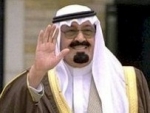10 September 2006
New college program brings Saudis to U.S.
 MANHATTAN, Kan. -- Thousands of students from Saudi Arabia are enrolling on college campuses across the United States this semester under a new educational exchange program brokered by President Bush and Saudi King Abdullah.
MANHATTAN, Kan. -- Thousands of students from Saudi Arabia are enrolling on college campuses across the United States this semester under a new educational exchange program brokered by President Bush and Saudi King Abdullah.
The program will quintuple the number of Saudi students and scholars in the United States by the academic year's end. And big, public universities from Florida to
Oregon are in a fierce competition for their tuition dollars.
The kingdom's royal family -- which is paying full scholarships for most of the 15,000 students -- says the program will help stem unrest at home by schooling the country's brightest in the American tradition. The State Department sees the exchange as a way to build ties with future Saudi leaders and young scholars at a time of unsteady relations with the Muslim world.
But some officials say efforts to fast-track educational diplomacy with Saudi Arabia could use additional scrutiny. Clark Kent Ervin, a former inspector general of the Department of Homeland Security (DHS), said the U.S. government has yet to ensure proper safeguards are in place to do effective background checks on all applicants.
Administrators at Kansas State University, an agricultural school surrounded by miles of prairie grass, say the scholarships are a bonanza for public education.
"The Saudi scholarship program has definitely heightened our interest in that part of the world," said Kenneth Holland, associate provost for international programs. "Not only are the students fully funded, but they're also paying out-of-state tuition."
Kansas State administrators say common misperceptions about the oil-rich nation make it crucial to create a tolerant environment for Arab and Muslim students, who have been singled out for scrutiny since the September 11 attacks.
Before then, Saudi visa applicants were allowed to bypass the U.S. Embassy in Riyadh by submitting their applications to preapproved travel agencies, which forwarded them onto the consulate for approval or rejection. Three of the 15 Saudi September 11 hijackers used that program, dubbed "Visa Express," to enter the United States.
"Since then, everything has changed," Saudi Embassy spokesman Nail Al-Jubeir said. "There are long lines to wait for a visa. Once they get in to a university here, they are checked and rechecked."
In 2002, Congress mandated that the DHS create the "Visa Security Officer" program in consular offices in Saudi Arabia.
That would bump up security by allowing counterterrorism officials to check visa applications against lists of known or suspected terrorists, Mr. Ervin said.
That same year, Congress also instituted the Student and Exchange Visitor Information System, or SEVIS, which monitors all foreign students' activities -- including where they live, whether they go to class and whether they finish their studies.
21:30 Posted in UNITED STATES | Permalink | Comments (0) | ![]() Facebook |
Facebook |



















The comments are closed.